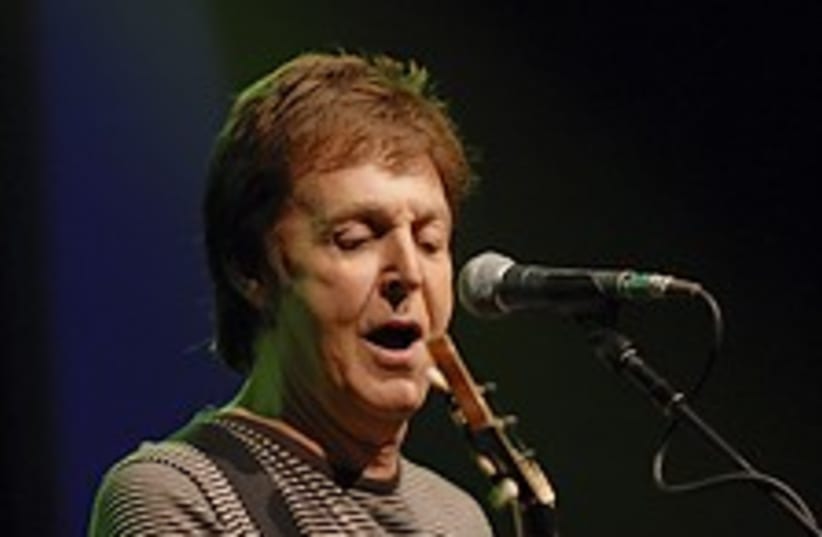Analyze This: How McCartney could rock Ahmadinejad's world
The Beatles have left their mark even on the Islamic Republic.
It's probably safe to say that Paul McCartney, performing here this week in defiance of radical Islamist threats, won't be following up any time soon with a similar appearance in Iran.
But McCartney and The Beatles have apparently left their mark on that country.
"I first heard of the Beatles sometime around 1964, when I was a sixth-grader in Teheran," wrote Iranian-American émigré Mehrdad Mehdizadeh in 1996; "I remember all the sensation about The Beatles, or 'Beatelha,' as we called them. Then when I went to high school, the whole Beatles thing became even more intense. We lived through most of those years with talk of The Beatles, and exchange of their 45s and LPs and sheet music. Very soon Beatles-imitation bands formed in Teheran."
"At some time in that amazing era, probably in 1966, Paul McCartney himself made a short, live appearance on Iranian national TV. Apparently his plane had a stop-over in Teheran and he agreed to come to the TV station and give a short interview."
Such a thing is of course impossible in today's Iran; no Western pop star has been permitted to perform there since the Islamic Revolution of 1979.
The spirit of rock, though, apparently hasn't been entirely doused in the land of the mullahs. Just last June, Time magazine, in an articled titled "Rock me, Ahmadinejad," profiled the underground rock scene stirring in Iran despite the heavy hand of official censorship, reporting: "Radio runs government-approved pop music, but independent rockers and rappers have thus far failed to receive permits for concerts or album releases."
Iranian President Mahmoud Ahmadinejad and the radical Islamists keeping an iron grip on their country have good reason to fear the rebellious spirit of rock 'n' roll. The liberating messages contained in the rhythms and lyrics of the best pop music have posed a threat to repressive social structures and strictures for more than a half-century now, even getting credit on occasion for contributing to the downfall of repressive governments such as the former Soviet Union and its satellite regimes in Eastern Europe.
As McCartney touched down in Israel to bring his musical message of peace and love to a part of the globe where those qualities are too often in short supply, Ahmadinejad was making his own appearance at the opening of the UN General Assembly, singing his usual tune of violence and hate - especially directed to the Jewish state.
In deciding to perform here in the face of protests by those who think like Ahmadinejad, McCartney told The Jerusalem Post last week: "I think that most people understand that I'm quite apolitical and that my message is a global one and that it is a peaceful one."
Not everyone. That McCartney's belated appearance here spurred threats against the former Beatle by those who call for Israel to be singled out for exceptional condemnation, is merely a less serious, but no less troubling, sign of a time in which an Ahmadinejad is feted at the UN and given use of the General Assembly podium as stage for his anti-Semitic Holocaust denials and threats against the very existence of the Jewish state.
In some fairly dark times during the height of the Cold War, McCartney and the Beatles spoke to and for their generation in declaring "All You Need is Love."
Decades on, the charming naiveté of that message has lost none of its optimistic appeal - even though the generation that first sang along with that tune has since learned all too well that neither love alone, nor any words or music on their own, are sufficient to turn back intolerance and hate, especially when they are elevated to national policy.
It will certainly take more than such noble sentiments to blunt the threat that an Ahmadinejad poses not only to this country, but to other states in this region, the free world as a whole, and most of all to his own oppressed people, especially if he gets his hands on nuclear weapons.
Still, Paul McCartney's long-awaited arrival here is far more than a show-biz story, and helps provide this nation's people with a sense of normalcy that Ahmadinejad will do his best to upset this week in New York.
But the temporary relief McCartney will provide us from some of the other, more distressing, headlines of the week, will only become permanent if and when he is finally permitted to make a return trip to Teheran - and this time with the chance to sing at least a few of his silly love songs.
Calev@jpost.com
if(catID != 151){
var cont = `Take Israel home with the new
Jerusalem Post Store
Shop now >>
`;
document.getElementById("linkPremium").innerHTML = cont;
var divWithLink = document.getElementById("premium-link");
if(divWithLink !== null && divWithLink !== 'undefined')
{
divWithLink.style.border = "solid 1px #cb0f3e";
divWithLink.style.textAlign = "center";
divWithLink.style.marginBottom = "40px";
divWithLink.style.marginTop = "40px";
divWithLink.style.width = "728px";
divWithLink.style.backgroundColor = "#3c4860";
divWithLink.style.color = "#ffffff";
}
}
(function (v, i){
});

